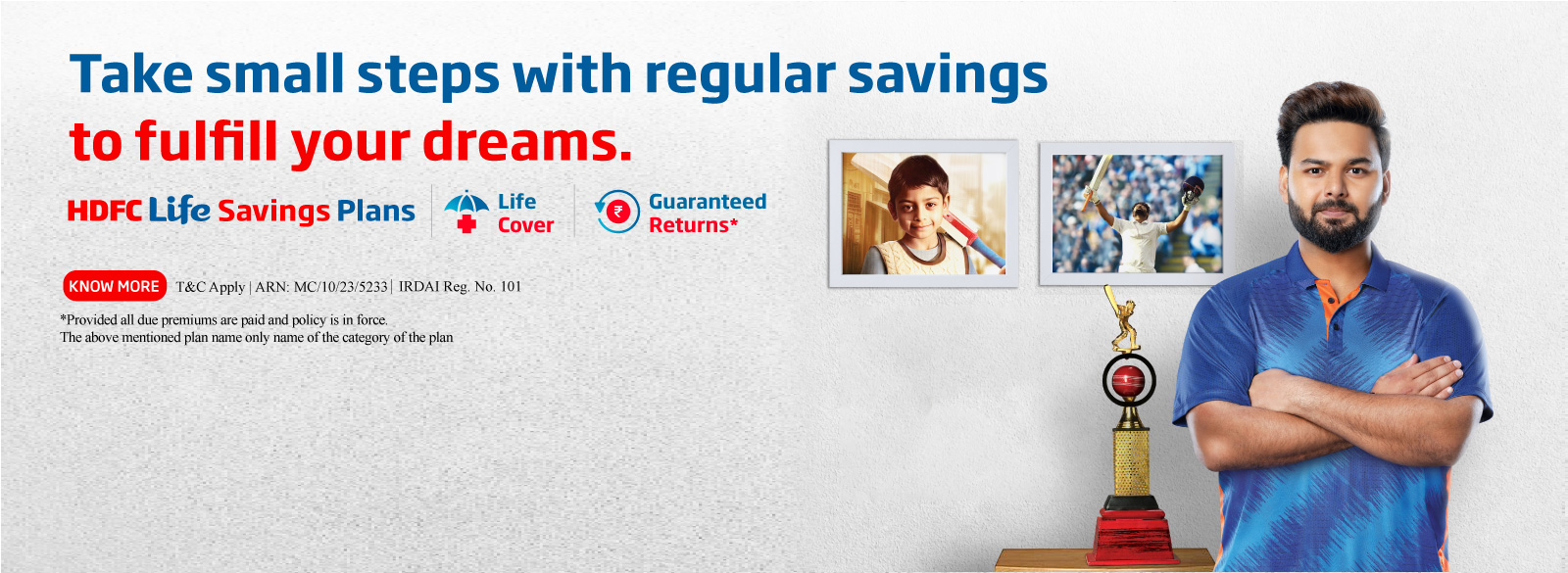- Webpages
- Documents
- HDFC Life ClassicAssure PlusInvestment
- HDFC Life ClassicAssure PlusInvestment
- HDFC Life ClassicAssure PlusInvestment
For NRI Customers
(To Buy a Policy)
-
Call (All Days, Local charges apply)
-
Email ID
-
![Contact Image]()
Whatsapp
(If you're our existing customer)
-
Call (Mon-Sat, 10am-9pm IST, Local Charges Apply)
-
Email ID
For Online Policy Purchase
(New and Ongoing Applications)
-
Call (All Days & Toll free)
-
Schedule a call
-
![Contact Image]()
Whatsapp
-
Give missed call to buy a policy
-
Email
Branch Locator
-
![Contact Image]()
Locate a branch
For Existing Customers
(Issued Policy)
-
![Contact Image]()
Whatsapp
-
Call (Mon to Sat, from 10 am to 7 pm, Call charges apply)
-
Email
Fund Performance Check
-
Call (Missed Call)
What do you want to do?
Get a Call Back
This service is available between 9 AM - 9 PM IST
Interested in buying insurance plans, then fill the form below to help us call you back. This form is only for exploring insurance plans provided by HDFC Life, for Customer Service queries, please click - Customer Service Queries
Thanks for contacting us.
Will get in touch soon.
Your call is scheduled for , between . You will receive a call from 8291890XXXX. Kindly attend the call. We respect your privacy. We do not spam.
Your call is rescheduled for , between . You will receive a call from 8291890XXXX. Kindly attend the call. We respect your privacy. We do not spam.
Your call is already scheduled for , between . Incase you want to reschedule the call; you can do it using the form above.
We're sorry, but you have reached the maximum number of rescheduling attempts allowed.
Our Recommended Insurance Solutions
The effective way to secure your family’s future
-
Key Features*
HDFC Life Click 2 Protect Super Trending
UIN: 101N145V02
Looking for complete protection under one plan at affordable cost along with tax benefits1
UIN: 101N145V02
Looking for complete protection under one plan at affordable cost along with tax benefits1
- Get back your premiums at zero cost via Smart Exit Benefit Option1
- Buy Online and get 7% discount3
- Death Benefit paid in advance on diagnosis of Terminal illness
- Get back your premiums at zero cost via Smart Exit Benefit Option1
- Buy online and get 7% discount3
- Death Benefit paid in advance on diagnosis of terminal illness
Term Plan -
Key Features*
HDFC Life Click 2 Achieve TRENDING
UIN: 101N186V03
Industry first Life Insurance policy that gives upto 200% Return Of Premium.
UIN: 101N186V03
Industry first Life Insurance policy that gives upto 200% Return Of Premium.
- Tailor your plan with customizable options for Lump Sum, periodic income, or money-back features.
- Decide the amount of income you wish to receive, perfectly tailored to your needs.
- Enjoy a Guaranteed4 Immediate Income with the freedom to select the duration of your choice according to specific requirements.
- Tailor your plan with customizable options for Lump Sum, periodic income, or money-back features.
- Decide the amount of income you wish to receive, perfectly tailored to your needs.
- Enjoy a Guaranteed4 Immediate Income with the freedom to select the duration of your choice according to specific requirements.
Savings Plan -
In Ulip Plan, the investment risks in the investment portfolio is borne by the policyholder
Key Features*HDFC Life Sampoorn Nivesh
UIN: 101L103V03
An insurance cum investment plan with loyalty additions and multiple fund options to help you optimize your investmentUIN: 101L103V03
An insurance cum investment plan with loyalty additions and multiple fund options to help you optimize your investment- Choose from 10 Funds to optimize your investment returns
- Customize your premium payment options – Single, Limited or Regular
- Choose from 3 convenient Benefit options to customize your payouts
- Choose from 10 Funds to optimize your investment returns
- Customize your premium payment options – Single, Limited or Regular
- Choose from 3 convenient Benefit options to customize your payouts
ULIP Plan
*T&C Apply.
Personal Details
Your Required life cover to protect your family’s future is
₹ 0
Recommended plans for you
Life Insurance
How Much Life Insurance?
With so many considerations, let us help you to make easy decisions for your life insurance needs.
Get a Call Back
This service is available between 9 AM - 9 PM IST
Interested in buying insurance plans, then fill the form below to help us call you back. This form is only for exploring insurance plans provided by HDFC Life, for Customer Service queries, please click - Customer Service Queries
Thanks for contacting us.
Will get in touch soon.
Your call is scheduled for , between . You will receive a call from 8291890XXXX. Kindly attend the call. We respect your privacy. We do not spam.
Your call is rescheduled for , between . You will receive a call from 8291890XXXX. Kindly attend the call. We respect your privacy. We do not spam.
Your call is already scheduled for , between . Incase you want to reschedule the call; you can do it using the form above.
We're sorry, but you have reached the maximum number of rescheduling attempts allowed.

Not sure which Life Insurance to buy?
Talk to an
Advisor right away
Advisor right away

We help you to choose best insurance plan based on your needs
Get a Call Back
Interested in buying insurance plans, then fill the form below to help us call you back This form is only for exploring insurance plans provided by HDFC Life, for Customer Service queries, please click -Customer Service Queries
Thanks for contacting us.
Will get in touch soon.
HDFC Life Sanchay Par Advantage

A customized savings plan to match your expenses and financial needs.
Key Benefits of Online Purchase
Safe and Transparent
All Terms and conditions, policy charges, shown upfront with no hidden costs or details. What you see is what you get.
Certified and Registered Online Agents
Our online agents will guide you every step of the way - Product selection, Form filling, Payment and After sales customer service. Each step is available and accessible online. All our calls are recorded for accountability.
Exclusive Online Discounts
Depending on the product type, purchasing insurance online is economical. Example: You get additional 7% online discount on your first premium on our term product: HDFC Life Click 2 Protect Super
Convenience at your fingertips
Explore all products & plan options, choose policy terms, do premium payments, all from the comfort of your home. Also get support from online and 400+ branches across India.
HDFC Life Insurance - Customer Stories!

"Thanks to HDFC Life, I am now able to pursue my education abroad and fulfill my parents' dreams"
Sartajbir Singh
Batala, Punjab

Caringwith
Pride
Sartajbir Singh
Batala, Punjab

Caringwith
Pride
" I want to express my gratitude to Mr. Nishant Sharma from HDFC Life for his invaluable assistance during my difficult time. As an 18 yr old, managing the death claim of my mother while my father was working abroad, I was distressed. Nishant not only helped me with all the documentation for claim submission but also provided unwavering support throughout. His guidance made a significant difference in navigating the claims procedure. The claim closure time efficiency was an additional source of relief during this challenging period. I must emphasize Nishants exceptional character and dedication. He truly went above and beyond to help me out. Thanks to HDFC Life, I am now able to fulfill my parents' dreams."

INT/MC/06/23/1951

"HDFC Life's prompt service amazed me as I received the claim amount within 24 hours"
Anoop Chahar
Agra, Uttar Pradesh

Caringwith
Pride
Anoop Chahar
Agra, Uttar Pradesh

Caringwith
Pride
" I am grateful to Mr. Harish Rawat and HDFC Life for their incredible assistance in processing my father's death claim. HDFC Life's prompt service amazed me as I received the claim amount within 24 hours of applying. Mr. Harish went the extra mile by personally arranging the required hospital discharge summary required for claim submission. I sincerely thank Mr. Harish and HDFC Life for their outstanding dedication and support. Their commitment to their responsibilities and customers is truly commendable, and I am forever grateful for their exceptional service."

INT/MC/06/23/1951

"In addition to the quality service, the transparency displayed by HDFC Life has instilled confidence in me as a customer"
Parna Acharya
Batala, Punjab

Caringwith
Pride
Parna Acharya
Batala, Punjab

Caringwith
Pride
" The seamless and efficient claim processing of my late husband's HDFC Life Term plan has provided us with the much-needed financial stability during this challenging time. Moreover, the personalized attention and empathy shown by the staff has left a lasting impression on me. I would like to express my gratitude for timely communication throughout the entire process by Mr. Subhadip. His prompt updates and clear explanations helped alleviate my concerns and kept me informed at every step. In addition to the quality service received, the transparency displayed by HDFC Life has instilled confidence in me as a customer. Thank you for being there for me and my family during this difficult journey."

INT/MC/06/23/1951
About
HDFC LIFE
HDFC Life is one of India's leading life insurance company offering a range of individual and group insurance solutions that meet your various needs such as Protection, Pension, Savings & Investment, Health and more.


SUPERBRAND FOR THE 9TH TIME
Superbrand 2023-24
SUM ASSURED
11 lakh crore
New Business
BRANCHES
498
Across in India
ASSETS UNDER MANAGEMENT
2,38,782 Crs
In FY 22-23
NUMBER OF LIVES INSURED
6.8 crore
In FY 22-23
# As per HDFC Life Integrated Annual Report FY 2022 - 2023


Claim Track Record
for FY 2022-2023

We have honoured 99.39% Individual Claims!*
At HDFC Life, we ensure a hassle-free and uniquely sensitive claim experience. We are always doing our utmost to enable faster settlement of claims, with our Claim Settlement Ratio reflecting this assurance.

Same Day Claims Processing
Individual claims processed within 24 business hours for all claims over 3 years from the date of inception**.
*Individual death claim settlement ratio by number of policies as per audited annual statistics for FY 2022-23.
Check last 5 years claims trend.**Provided we have received all the relevant and required documents and no further investigation is required. Claim settlement process would be completed within stipulated timelines once the claim request is approved.
Know MoreClaim Settlement Ratio
( Percentage and average claim settlement time )
Average Claim settlement time: 2 days
Average Claim settlement time: 3 days
Average Claim settlement time: 5 days
Average Claim settlement time: 4 days
Average Claim settlement time: 4 days

One Day Claim Settlement
is available for the following
- Cumulative claim amount on all policies up to ₹2 crores
- 1 day claim settlement is exclusively available for policies bought online
- Claim does not require field investigation
- All requisite documents # submitted by the nominee before 3 PM on a working day at HDFC Life branches. Intimations beyond 3 PM will be taken up the next business day
- HDFC Life will pay an interest on your death claim amount for every day of delay beyond one working day
T&C Apply
1. For all claims fulfilling above mentioned conditions, provided we receive all the required documents, the claim will be processed within one working day and decision will be communicated accordingly.
2. Investigation / Open title / Rival / Court involved Claims are excluded.
3. Policy duration at the time of event is at least >=3 years.
4. Saturday, Sunday, public festivals and non-NAV days (for ULIP) are excluded (not treated as a working day) ^Interest rate would be at 6.25%per annum.
#Documentation Details
Claim form, Nominee photograph, Pan card copy, Identity and Address proof of nominee. (If nominee is minor, documents of appointee to be submitted). Death certificate issued by competent authority for death registrations. Medical cause of death certificate. Cancelled cheque/copy with the name of nominee/appointee mentioned on it as per the passbook of the nominee/appointee. Past & current complete medical records including discharge/death summary, indoor case papers, investigation reports, consultation notes. In case of an accidental death, additional documents will be required. Post Mortem Report, Panchnama, Police Inquest report, First/Final Information report, Viscera/Chemical Analysis report.
What is life insurance?
Have you ever wondered what would happen to your family in case of your untimely demise someday? Who will take care of their finances, such as their EMIs, grocery, education and marriage expenses? Will your investments or savings be enough to help them survive for long? If you are indeed worried about all this, then life insurance is surely the answer.
In exchange for your premium payments over the course of the policy term, the life insurrer such as HDFC Life offers you a life cover sum. Life insurance cover safeguards the future of your family by providing a lump sum payment, also known as a death benefit, in the event of your untimely demise during the policy’s term. Moreover, upon the expiration of the policy term, certain life insurance policies offer you a maturity benefit.
As you pay the life insurance premiums, the insurer agrees to pay a certain amount of money to the beneficiary of the life insurance policy upon the policyholder's death or after a predetermined period of time, which is the cover amount.
Because paying premiums is the only way to access all the benefits of a life insurance policy, it is best to choose a premium that is affordable. Only when you keep paying all premiums on time, the insurer offers the cover amount promised.
Now comes the question, why buy a life insurance? What benefits does it offer? Well, let us simplify that for you.
The most vital benefit of life insurance is safeguarding your finances. Any type life insurance plan has the ability to give your family financial stability is one of its main advantages. A death benefit is a core part and is included in life insurance policies. Your family members or nominee(s) will receive the sum assured, which is a predetermined amount if you pass away within the policy's term. This guarantees your family members' financial stability even when you aren't around.
The second benefit of life insurance is that it helps inculcate a savings habit. In order to maintain the validity of your life insurance policy, you must make periodic payments or premiums. Your policy may be cancelled if premiums are not paid. Thus, you develop a saving habit that will serve you well in the long run by investing on a regular basis.
Life insurance also promotes tax savings. The government has extended tax savings to a wide range of investment instruments in an effort to encourage savings and investment. One such tool is life insurance. As per deductions under Section 80C of the Income Tax Act of 1961*, you are eligible to receive a tax deduction of up to Rs 1.5 lakh for the annual premium that you pay. You thus get the advantage of both tax savings and investment.
Another benefit is that life insurance helps reach your major financial goals in life. Over time, some life insurance policies accrue cash value. Policies for life insurance, like ULIPs, also include an investment component. Your premium is invested and yields a return on marketable securities. They accumulate over time into a sizable corpus that can be utilised to accomplish objectives like your child's education, child marriage, etc.
The fifth benefit of life insurance is distribution & wealth protection.One of the safest long-term investment options are life insurance policies. Hence, having life insurance will enable you to protect your wealth from taxes & inflation for an extended period of time. Because of this feature, life insurance plans are excellent tools for retired investors to create long-term pensions.
How Does Life Insurance Work?
While purchasing any type of life insurance, it's important for you to understand how it works and how your nominee can receive the benefits of your policy. Better understanding will help you on deciding on frequency of payment, payout plan and sum assured.
1. Buying life insurance
When buying a life insurance, it's important to consider the following factors:
- Life coverage you need
- Type of life insurance that will meet your financial needs
- Premiums that you will pay. For example term insurance calculator can help you with calculating the premiums to buy term insurance
- Add-on riders that will help you get a comprehensive financial cover
- Differences between various life insurance quotes for each possible policy
2. Payment of Premium
The premiums of a life insurance is dependent on a few factors, such as type of life insurance you purchase, term of the policy, premium paying term, your age, your gender, the insurance company selling the policy, and your overall health, wellness, and family history.
- To calculate premiums for term insurance plan you can use term insurance calculator
- To calculate premiums for ULIP you can use ULIP calculator
- To calculate premiums for savings plan you can use savings calculator
- To calculate premiums for investment plans you can use investment calculator
3. Claims
As far as the claim is concerned, if the insured passes away during the policy's tenure, a death benefit is paid to the insured's designated nominee in an amount predetermined by the insurer. Making a claim for this is a fairly easy process. A claim can be submitted online, through text message, email, phone at the insurer's call centre, or in person at a branch office. In order to expedite the claim processing, it is best to notify the insurer as soon as the required paperwork is prepared. Do research on the insurer's claim settlement ratio prior to buying a life insurance policy. This indicates the possibility that your claim will be resolved.
What are the different types of life insurance?
Some of the types of life insurance are:
1 Term Insurance
Term insurance safeguards the future financial stability of your family in the event of your death. Term insurance is a pure protection plan. In addition, compared to other life insurance products, term insurance has cheaper premiums. If you purchase large covers early in life, the premiums are also more reasonable. You can opt to get all your premiums back after the term of the policy in case you survive through term insurance with return of premium. If you want to get critical illness insurance then you can choose avail the critical illness rider along with your base term insurance.
2 Whole Life Insurance
Whole life insurance is a plan that provides life cover for the whole life of the policyholder. It may extend to 99 or 100 years of age.
3 ULIP
Investment and insurance products are combined in a unit-linked insurance plan (ULIP). Your loved ones can have financial security with ULIP. Furthermore, it provides you with the opportunity to generate wealth via market-linked returns from systematic investments.
You can invest your money in a variety of fund options with a ULIP, based on your tolerance for risk. The money invested in ULIPs can be used to purchase bonds, stocks, hybrid funds, and other securities. The lock-in period is five years. Bonds are an excellent option if you're searching for something safer. Conversely, equities and hybrid funds may yield higher returns if you are willing to take on more risk.
Because every person is unique, ULIPs offer a great deal of investment flexibility. As you get older, your investment preferences and risk tolerance are probably going to change. With ULIPs, you can take these things into account and adjust your investing strategy as necessary. Additionally, ULIPs offer flexibility with regard to fund switching and partial withdrawals.
4 Retirement Plans
Retirement plans or pension plans are made to assist you in accumulating a substantial amount of money for your post-retirement years. In the years you don't work, they assist you in becoming financially independent. You can invest and save for the future with retirement plans, which gives you the chance to build up a sizable amount of wealth. Investing in retirement plans allows you to provide financial security for your family & loved ones by offering insurance benefits.
You have the chance to obtain potentially higher returns with retirement plans. Investing your money in a combination of debt and equity allows you to do this.
5 Child Insurance Plans
Children should have the best, and purchasing a child insurance plan can help you save money for their future. One of the most important financial planning tools available to parents is a child plan. These plans can assist you in saving a sizeable amount for your child's college and marriage-related costs.
When a child reaches the age of 18, maturity benefits are paid out as a one-time payout or as annual instalments under a child plan. Additionally, the parent has built-in insurance coverage. Given that parents pay the premium, protection is a crucial component of child plans. If, regrettably, the insured parent dies within the policy's term, child plans may provide prompt reimbursement to meet the child's needs.
Being able to select where and how your money is invested is one of a child plan's most valuable features. You can opt to invest your premium in debt, equity, or balanced funds. Additionally, ULIP child plans guarantee that your returns will eventually be sufficient to combat inflation.
6 Savings and Investment Plans
Life insurance products that can assist you in building an assured financial corpus over time are savings plans. You can use these money to meet your financial obligations, as well as to meet your needs and future goals.
It has two advantages: it creates wealth and provides life insurance. The investment plans include death benefit as well. Additionally, depending on the kind of savings plan you select, it may serve as a backup source of income, enabling long-term planning. You can also decide to opt for a money back policy which has the dual benefits of financial cover as well as investments.
7 Group Insurance Plans
Group insurance plans facilitate the provision of numerous insurance benefits to a typical group of people at once. Groups and organisations can use these to offer effective life insurance benefits to their members or employees.
Now, you may ask why choose a group insurance plan. The primary benefit of group insurance plans is their hassle-free approach to large-scale insurance coverage. These plans are perfect for banks, societies, employers, associations, and financial institutions that provide coverage for a group of individuals who fit into a predetermined category.
Why should you consider buying life insurance?
Buying a life insurance is important in more ways than one. Let us explain why purchasing life insurance is not an option but a necessity:
Financial security for your family & loved ones
A life insurance plan can help your family live comfortably and worry-free by replacing your income in the event of your death. It assists them in maintaining their way of life and paying for bills like food, rent, schooling, etc.
To pay for your children's future education
If the family's primary provider dies, the cost of their education may become extremely burdensome. Even if you are not living, life insurance makes sure your kids attend the college of their choice.
To save for retirement and make plans for future
Unexpected occurrences such as illness and disability can cause financial ruin for your family. It functions as a safety net and pays for expenses in unanticipated situations.
To settle any debts you may owe
Your family may have financial hardships following your death as a result of your debts. Life insurance provides financial freedom to your family members by assisting them in paying off debts such as credit card bills and house loans.
To qualify for tax deductions** under the Income Tax Act
Under section 80C of the Income Tax Act, you can benefit from tax deductions of up to Rs 1.5 lakhs annually with the premiums you pay. You can also avail deductions under 80D for the premiums you pay for add-on riders.
For financial security and peace of mind
Life insurance can provide you with a sense of calm by ensuring that your family is secure financially and does not need to worry about your debts. You can then live a confident and stress-free life.
Who should buy life insurance?

Newly married people
Married couples need life insurance, especially if one partner depends on the other's income. It guarantees that the surviving spouse can continue to live comfortably and pay for things like household bills and the EMIs.

Young parents
Having life insurance to cover your children's expenses in the event of your incapacity is essential if you have young children. The cover includes paying for regular bills, schooling, marriage, and additional costs associated with raising children.

Individuals with financial liabilities
If you have a large amount of debt, such as a mortgage or student loan, life insurance can make sure that your family won't be left to deal with it after you pass away.
Also, if you are single and your dependents are dependent on your income, like ageing parents or older siblings, life insurance can give them the necessary financial support following your death.

People about to get retired
Certain life insurance policies, such as whole life insurance plans or universal life insurance, can help you meet your financial objectives by giving you extra income during your golden years if you're planning for retirement and want to augment your retirement savings.
What Happens When You Purchase Life Insurance?
When you buy a life insurance policy, you sign an agreement and pay a premium—either monthly or annually—to the insurance company on a regular basis for a predetermined amount of time.
The insurer will provide your dependents or loved ones with access to the assured sum in the event of your death. If you survive, you might be eligible for a maturity payment based on the terms and conditions.
It provides your family with financial security by acting as a cushion.
What to anticipate when buying a life insurance policy is as follows:
- Choosing a policy: You must first decide on the kind of life insurance policy you want, the amount of coverage you need, a term that best suits your needs, and the beneficiaries.
- Application: After that, you complete the required steps and fill out the application form. A medical examination might also be necessary to evaluate your health.
- Approval and payment: After that, you get the policy documentation and start making regular premium payments.
- Regular premium payment: Throughout the policy's term your main concern is making premium payments to maintain the status of your policy. Additionally, you are free to modify as needed.
- Maturity/Death: When the policy matures or the insured passes away, the insurer will pay the designated beneficiaries the death benefit or maturity amount.
Once you buy life insurance, here are the benefits which it will offer in your financial life:
- It lowers your tax burden
You should buy insurance if for no other reason than that you can deduct your premiums from your taxes.
- It will assist your family with debt repayment.
We never know what the future holds for us in life. Your family might have to deal with a car loan, credit card debt, or other loans if something were to happen to you. A life insurance policy's payout can assist your loved ones in paying off these debts.
Healthy individual.
- It can provide you assistance in achieving long-term goals.
You can invest modest sums that will add up over time to help you buy the house of your dreams or launch the business of your dreams, depending on the insurance plan you select.
- It offers a safety net for finances.
Being the breadwinner in the family, your loss will have a financial as well as emotional impact. Your family and loved ones will have a financial safety net to support them during their grieving process if you have good life insurance.
FAQs about Life Insurance
1 What are the benefits of life insurance?
The biggest benefit of life insurance is that no matter your income level, life insurance ensures that your loved ones can make ends meet if you were to pass away.
Buying a life insurance policy at any stage in life gives you peace of mind. It offers a life cover that keeps you and your family protected in case of your unfortunate demise. The life insurance claim in the event of your death will help your family have a secure financial future, by paying for children's education, paying off debts and helping towards household expenses. The money you invest in life insurance is safe, and your family stands to gain from the benefits of insurance payouts in case of unforeseen circumstances.
Life insurance premiums are eligible for rebate for salaried persons to reduce their tax liability. Life insurance also gives you the benefit of taking a loan against the policy in certain cases. A life insurance policy will help you to plan your life goals, including your children's education, their marriages and your retirement corpus.
The riders available with your life insurance policy help you customise your plan and get maximum benefit.
There are different types of life insurance which help you reap the benefits of a secure future for yourself and your family.
2 What do you mean by life insurance?
It is a contract between a policyholder and the insurer wherein the insurer agrees to pay a certain sum of money in exchange for premiums upon death or maturity of the policy.
3 How to choose the right sum assured under life insurance?
It can be done by forecasting future earnings, making a note of future annual expenses, calculating the future costs of financial goals such as children's education and marriage, and adding liabilities. Or you can also multiply your annual income by 10 for a rough idea.
4 What are life insurance quotes?
You can find out the estimated cost of a potential policy with an insurance quote. It also contains other important details regarding the policy and the things that are covered.
Using the information on your insurance quote, you can determine that policy offers the best value by comparing it to quotes from other policies for the same or comparable coverage. If the policy is term life insurance, the term limits and coverage limits are usually included in life insurance quotes.
5 Who needs life insurance the most?
Anyone who has dependents to support and is an income earner for the household needs Life Insurance. Your loved ones who depend on your income would be negatively impacted by your untimely passing and the subsequent loss of income. A life insurance policy makes sure their financial future is protected through the payouts by the insurer in case of the insured person's death.
If you own a business, it helps to have life cover so that the business is not negatively impacted by your passing. It can help to sustain it by covering expenses and paying debts till your successor finds their feet in the business.
If you have taken loans during your lifetime, having a life cover will help your family to pay off your debts with the help of the payouts received against the insurance claim.
6 What are the types of life insurance plans?
In India, we have a variety of insurance plans to suit every need.
The simplest plans are Term insurance plans, in which there is a death benefit but no maturity benefits. In Term Insurance, the insurer promises to pay the beneficiaries a lump sum amount in the event of the insured person's death. Some Term insurance plans nowadays also offer to give back the premiums you pay on surviving the policy period; these are called Term insurance with return of premium plans.
Other life insurance plans in India include Endowment Insurance plans, Unit Linked Insurance Plans (ULIPs), Moneyback Insurance plans, Whole life insurance plans, Group life insurance, Child Insurance Plans and Retirement Insurance Plans.
7 What are the factors that affect life insurance premium?
The main factor influencing the life insurance premiums of a policyholder is their age. Younger persons are generally considered healthy and unlikely to contract illnesses or pass away suddenly; hence younger people attract lower insurance premiums.
Gender is another factor that determines the premium amount as proven scientific and statistical evidence points to women likely to live an average of 5 years more than men. Consequently, since women are perceived to avail of policies for a longer tenure, they can avail of lower premiums.
Medical records play a crucial factor in deciding the premium as well, since life insurance policies typically come with an underwriting process that includes a thorough medical exam of the policyholder. Any red flags concerning physical health and potential illnesses can have an impact on the amount of premium to be paid.
Family history is important as certain hereditary diseases could be passed on to the policyholder. The family's medical history plays a part in revealing these patterns and can influence the amount of premium.
Smoking and drinking, which are considered harmful to health and can impact your longevity, also influence the amount of premium to be paid. Professions and lifestyles can also impact the life insurance premium. Persons working in professions considered dangerous like mining, oil and gas and fisheries, and indulging in risk taking activities like mountaineering can attract higher premiums.
8 How do I file a life insurance claim?
Life insurance claims can be made either on death of the policyholder, on maturity of the policy or as a Rider claim. In case of death claim, the beneficiary who is the nominee of the policy should intimate about the claim to the insurer at the earliest by filling the intimation form which can be obtained from the nearest branch of the insurance company or can be downloaded from the website of the insurance company. Relevant documents like death certificate of the insured person, birth certificate of the insured person (for proof of age), the original policy document, and any other documents requested by the insurer should be provided.
The insurer is obliged to settle claims, once filed, within 30 days of receipt of all documents. In case further investigation is needed, the insurer gets six months to complete its procedures from the date of receiving written intimation of the claim.
If you are making a maturity claim, the insurer reaches out to the policyholder in advance with a bank discharge form, which the policy holder has to fill in and submit to the insurer along with the relevant documents requested.
In the case of rider claims, which are additional benefits accruing to policy holders for paying extra premium, duly filled claim forms and policy copies are to be submitted to the insurer. Different riders like Waiver of Premium and Critical Illness are settled through different means.
9 What types of death are not covered by life insurance?
While deaths due to accidents are covered by life insurance, there are certain exceptions. Accidental death if the insured is involved in any criminal activity or if death occurs due to intoxication or drugs are not covered by term life insurance plans. Accidental deaths while the insured was engaged in adventure sports like sky diving and bungee jumping are also not covered by such plans.
Death benefits for suicide are generally made at the discretion of insurance companies. Usually, beneficiaries are entitled to 80 per cent of amount accumulated from premiums paid in case of a non-linked plan, and 100 per cent in the case of a linked plan, if the insured dies by suicide within the initial 12 months.
Term insurance plans do not cover death occurring from self-inflicted injuries, or due to illnesses like sexually transmitted diseases like HIV/AIDS.
Death due to alcohol or drug abuse is also not covered by term plans, nor is homicide where the policy holder is murdered by the nominee for money. Death due to an existing illness that has not been disclosed at the time of purchasing the plan is also not covered by term life insurance plans. Death caused by natural disasters like tsunami, earthquake, floods etc is not covered by term insurance, unless the policy holder has opted for riders for that purpose.
10 What are the uses of life insurance?
It offers benefits like tax benefits, financial security, financial coverage for families, wealth creation, retirement planning, the accomplishment of future goals, and much more.
Learn more about Life Insurance Products
1 What are the 3 benefits of term insurance?
The premiums are reasonable, your family will be financially secure in the event of your death and you may even add coverage for critical illnesses and accidental deaths.
2 Is it good to have a term insurance plan?
It is possible for a family to achieve their financial goals as well as meet their day-to-day expenses by purchasing a term insurance policy. The dependants of the insured do not suffer financially if a term insurance is in place.
3 Is accidental death covered in term insurance?
Accidental death is covered by a term insurance policy. The sum assured on a term insurance policy will pay out no matter what the cause of death is, whether it is a result of a health issue or an accident.
4 What happens at the end of a term life policy?
When term life insurance policy plans expire, the policyholder does not have to take any action. A policyholder will be notified that the policy is no longer in effect; no premiums are payable, and no death benefits would be paid out.
5 What are the Death Benefits under Term life Insurance?
Death Benefits are paid to your dependents in a lump sum payment if you die unexpectedly. But few term insurance policies do provide a monthly income along with a lump sum amount to assist with regular expenses.
6 What is Term Insurance Premium?
This is the sum of money you pay the insurance company in exchange for financial security. A monthly, semi-annual, or annual premium payment can be made.
- Savings
- ULIP
- Retirement
- Child
1 What is a savings insurance plan?
A savings insurance plan is a type of insurance policy that allows you to invest for a financially secure future. These plans help you develop a disciplined habit of saving and aid to achieve your future goals. Crucially, they offer life coverage for the policyholder, securing the family’s financial future.
2 Why should you invest in a savings insurance plan?
If you are risk-averse but want to build a corpus for your future financial goals, a savings insurance plan like the HDFC Life Guaranteed Income Insurance Plan8 could be ideal. These policies offer life coverage, protecting your loved ones and providing them with financial support at a difficult time. Additionally, it helps you develop a disciplined saving scheme and builds up funds for your future.
3 What are the benefits of a savings insurance plan?
When you purchase a savings insurance policy like HDFC Life Sanchay Par Advantage9, you benefit from financial stability as it provides guaranteed returns to help you meet future expenses. The plan also offers life coverage for the policyholder, providing your loved ones with a financial safety net if anything happens to you. These plans are also eligible for tax savings under the Income Tax Act of 1961#.
4 What are the tax benefits of a savings insurance plan?
Savings insurance plans offer tax benefits under Section 80C# and Section 10(10D)# of the Income Tax Act. The premium amount is eligible for a deduction of up to Rs. 1, 50,000 per year from your taxable income under Section 80C#. Your premium should be less than 10% of the sum assured to be eligible for the tax benefit. Under Section 10(10D), the maturity and insurance benefits payable when the policy ends are tax-free.
5 Should I pick a long-term or short-term savings investment plan?
The savings investment plan term you select should depend on your goal. If you’re saving up for a short-term goal, such as a holiday abroad or home renovations, you can opt for a short-term plan. However, if you’re saving up to send your child to college, purchase a home, or for retirement, you should opt for a long-term plan.
6 Why choose a savings plan from HDFC Life?
HDFC Life offers steady returns and a competitive individual death claim settlement ratio, providing financial security to you and your loved ones. We offer multiple plans and customisable options, enabling you to find the ideal savings plan for your financial needs.
1 Is ULIP tax-free?
Section 80C provides an income-tax deduction for ULIPs, and Section 10(10D) of the Income Tax Act exempts returns from income tax upon maturity. This policy offers a dual benefit.
2 How much return does ULIP give?
Investing in ULIP can generate high returns if you stay invested for 10 years or more.
3 Who should invest in ULIP?
ULIPs are best suited for people who have a long-term financial plan that includes both wealth creation and insurance.
4 What are the common features of ULIPs?
ULIPs share four common features:
Option for Partial Withdrawal
Option for switching funds
Lock-in period required
An alternative long-term investment
5 What are the different types of ULIPs?
Type |
Risk |
Type of Returns |
Bond funds |
Medium |
Low to medium |
Equity funds |
High |
High |
Cash funds |
Low |
Low |
Balanced |
Medium |
High |
6 How is ULIP different from traditional plans?
ULIPs have a minimum lock-in period of three to five years, whereas traditional insurance plans are locked in until maturity. In addition, when you only want to insure, you must choose a traditional insurance plan. However, with a ULIP, you can get insurance while also increasing your capital.
1 Why is a retirement plan important?
Retirement planning not only ensures an additional source of income, but also assists in dealing with medical emergencies, fulfilling life goals, and becoming financially independent.
2 When should I buy a retirement plan?
The answer is simple: as soon as possible. Your twenties are a good time to start saving when you complete your education, start working and earn a pay check. This gives your money more time to grow.
3 What is annuity?
An annuity is a contract you enter into with an insurance company in which you pay a lump sum or series of payments in exchange for regular payments. The goal is to have a constant source of income, typically during retirement.
4 What are the types of Pension Plans?
Pension plans can be classified into three types: Defined contribution pensions, Defined benefit pensions, or State pensions.
5 How is a Pension Plan different from a Term Plan?
Life insurance that provides financial security to your family in your absence is termed term insurance. A pension plan, on the other hand, can replace lost income after 60 or if you retire early.
6 What are the tax benefits of Pension Plans?
The Income Tax Act, Section 80CCC#, encourages people to invest in pension plans. Pension investments can then be deducted from gross income, and saving taxes.
1 How much life insurance do you need for a child?
A good life insurance policy should enable parents to build a solid financial corpus that will help secure their child's financial future, such as their child's education, marriage, goals, and so on, in instalments or all at once, as needed.
2 What is the minimum age for life insurance?
The age range for policyholders to purchase term insurance is 18 to 65. Life cover up to age 99 is also available for those 65 and older.
3 Is it good to invest in a child plan?
It is good to invest in a child plan as it helps you to meet your children’s goals of higher education by building up a corpus over the years. A plan that matures after a certain period helps children meet their life goals without any worries. A child plan also serves as a blanket that provides financial protection to children in the event of the parent’s death.
4 What are the types of child plans?
A child plan is a customised investment and insurance option designed to meet a child's financial needs. A child plan has two components: insurance to provide financial protection for the child in the event of the parent's death and investment to meet financial milestones by investing in various instruments.
5 Why is beneficiary or nominee important in a child plan?
If a policyholder dies while the policy is in effect, the nominee will be entitled to death benefits. These death benefits can be used to cover the expenses of the child or nominee in the absence of the parent.
6 How can a child insurance policy secure your kid’s future?
A child insurance plan not only protects your child's dreams but also provides you with the financial assistance you need to help them achieve their goals. It's a way to save money for your children's future education costs without having to financially burden yourself.


Here's all you should know about life insurance.
We help you to make informed insurance decisions for a lifetime.
HDFC Life
Reviewed by Life Insurance Experts
HDFC LIFE IS A TRUSTED LIFE INSURANCE PARTNER
We at HDFC Life are committed to offer innovative products and services that enable individuals live a ‘Life of Pride’. For over two decades we have been providing life insurance plans - protection, pension, savings, investment, annuity and health.

Popular Searches
- term insurance
- Investment Plans
- savings plan
- ulip plan
- retirement plans
- health insurance plans
- child insurance plans
- group insurance plans
- bmi calculator
- compound interest calculator
- term insurance calculator
- what is term insurance
- 1 crore term insurance
- 2 crore term insurance
- 50 lakhs term insurance
- 5 crore term insurance
- investment plan for 5 years
- investment plan for 10 years
- get pension of 30000 per month
- get pension of 50000 per month
- ULIP Returns in 10 Years
- ULIP Returns in 5 Years
- Investment Calculator
- annuity plans
- Annuity From NPS
- Retirement Calculator
- Pension Calculator
- ULIP Calculator
- best investment options
- best investment options in India
- One time investment
- Types of investment
- Safest investment
- Short term investment
- What is investment
- PPF Calculator
- Term Insurance for Housewife
- Money Back Policy
- life Insurance policy
- Zero Cost Term Insurance
- NFO
- critical illness insurance
- Whole Life Insurance
- benefits of term insurance
- types of life insurance
- types of term insurance
T&C*
1. As per Income Tax Act, 1961. Tax benefits are subject to changes in tax laws.
2. This option can be exercised in any policy year greater than 30, but not during the last 5 policy years. This feature is not available if Life Goal or Return of Premium option is selected.
3. Sum Assured on Death, up to a maximum of Rs. 2 Cr. will be accelerated in case of diagnosis of terminal illness during the policy term. This feature is available till age 80 for Life and Life Plus option.
4. Guaranteed Benefit is paid on survival during policy term provided all due premiums are paid during the premium payment term.
7. Available under Level Cover with Capital Guarantee and Decreasing Cover with Capital Guarantee plan options.
8. HDFC Life Guaranteed Income Insurance Plan UIN: 101N146V04. A Non-Linked, Non-Participating Individual Life Insurance Savings Plan.
9. HDFC Life Sanchay Par Advantage (UIN: 101N136V03), A Non-Linked Participating, Life Insurance Plan coverage is available in this product.
Provided all due premiums have been paid and the policy is in force.
This option is available for entry ages 50 to 60 years.
#Tax benefits are subject to conditions under Section 10 and other provisions of the Income Tax Act, 1961. Tax Laws are subject to change from time to time.
#. The customer is requested to seek tax advice from his Chartered Accountant or personal tax advisor with respect to his personal tax liabilities under the Income-tax law.
^~. Total Premiums Paid are the total of all the premiums received, excluding any extra premium, any rider premium and taxes. In case ROP option has been selected, Total Premiums Paid includes premium paid for base plan option and the additional premium paid for ROP option. This benefit is available under Life and Life Plus option only.
*. For more details on other plans, please visit product category page on the website:- www.hdfclife.com
** Tax benefits are subject to conditions under Sections 80C and other provisions of the Income Tax Act, 1961. Tax Laws are subject to change from time to time.
ARN - ED/04/24/10755







